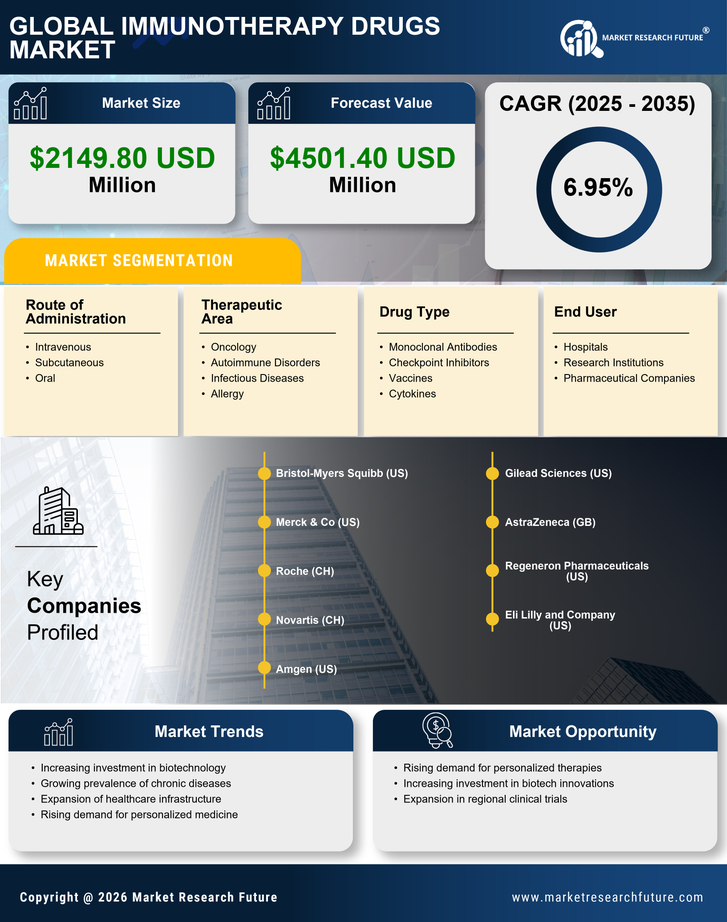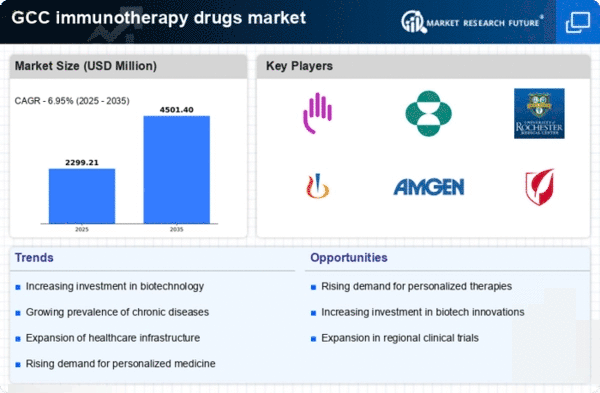Increasing Cancer Incidence
The rising incidence of cancer in the GCC region is a primary driver for the immunotherapy drugs market. According to recent statistics, cancer cases are projected to increase by approximately 20% by 2030. This alarming trend necessitates the development and adoption of innovative treatment options, including immunotherapy. As healthcare systems in the GCC strive to improve patient outcomes, the demand for effective therapies that harness the body's immune system is likely to grow. The immunotherapy drugs market is expected to expand significantly as healthcare providers seek to offer advanced treatment modalities that can potentially improve survival rates and quality of life for cancer patients.
Growing Awareness and Education
There is a notable increase in awareness and education regarding immunotherapy among healthcare professionals and patients in the GCC. Initiatives aimed at educating stakeholders about the benefits and potential of immunotherapy are gaining traction. This heightened awareness is crucial, as it encourages healthcare providers to consider immunotherapy as a viable treatment option. The immunotherapy drugs market is likely to benefit from this trend, as informed patients are more inclined to seek out these advanced therapies. Furthermore, educational campaigns are fostering a better understanding of the mechanisms of action of immunotherapy, which may lead to increased acceptance and utilization in clinical practice.
Government Initiatives and Funding
Government initiatives aimed at enhancing healthcare infrastructure in the GCC are significantly impacting the immunotherapy drugs market. Various national health programs are being implemented to promote research and development in innovative therapies. For instance, funding for cancer research has seen a substantial increase, with some countries allocating over $500 million annually to support clinical trials and drug development. These initiatives not only bolster the immunotherapy drugs market but also create a conducive environment for collaboration between public and private sectors. As governments prioritize cancer treatment, the market for immunotherapy is expected to flourish, driven by supportive policies and funding.
Rising Investment from Private Sector
The private sector's investment in the immunotherapy drugs market is witnessing a marked increase in the GCC. Venture capital firms and pharmaceutical companies are increasingly recognizing the potential of immunotherapy, leading to a surge in funding for startups and established companies alike. Reports indicate that private investments in biotechnology firms focused on immunotherapy have reached approximately $2 billion in recent years. This influx of capital is likely to accelerate the development of new therapies and expand the market. As private entities continue to invest in research and development, the immunotherapy drugs market is poised for substantial growth, driven by innovation and competitive advancements.
Technological Advancements in Drug Development
Technological innovations in drug development are propelling the immunotherapy drugs market forward. The advent of advanced genomic and proteomic technologies has enabled researchers to identify new targets for immunotherapy, enhancing the efficacy of treatments. In the GCC, investments in biotechnology and pharmaceutical research are on the rise, with funding reaching approximately $1 billion in recent years. This influx of capital supports the development of novel immunotherapeutic agents, which are increasingly being integrated into treatment protocols. As these technologies continue to evolve, they are likely to facilitate the introduction of more personalized and effective immunotherapy options, thereby expanding the market.

















